Marxist Criminology - Lecture notes 12 PDF

| Title | Marxist Criminology - Lecture notes 12 |
|---|---|
| Course | Criminology |
| Institution | London Metropolitan University |
| Pages | 3 |
| File Size | 50.3 KB |
| File Type | |
| Total Downloads | 39 |
| Total Views | 199 |
Summary
teacher is Will...
Description
Marxist Criminology – Week 13 Marxism and Capitalism Key ideas – most important starting point: social class. Concentration of power and wealth in small places. Classes – relationship with means of production. Either owns production (landlord etc. The Bourgeoisie.) doesn’t own anything, sells labour (worker, etc. The proletariat.) Infrastructure and superstructure Everything is determined by nature of economy. Economic determinism. Unstainable for society to operate with a few people getting rich etc., whilst rest is being exploited and poor. ‘False consciousness’ - we believe it’s in all of our interests. Ideology. Marxist Criminology Marx said little about crime. Focused on major social change. Willem Bonger Richard Quinney William Chambliss Stephen Box Main themes: -
Capitalism causes crime – crimes of powerless. People commit crime due to not enough food etc. too much wealth and no access. Consequence of an unequal society and an alienating society. ‘subsistence related crime’, related to poverty inherent in capitalism.
-
Subordinate classes more likely to be criminalised, labelled and less likely to have their interests protected by criminal law – street crimes, burglary etc.
-
Those in positions of power commit crimes which are destructive and damaging – greater impact than robbery or street crime.
-
Dominate classes define what is, and what is not, crime. Reflects own interests. – laws aren’t neutral, not to protect everyone. Political. One groups interest. To protect and sustain the ‘powerful’. greater impact than robbery or street crime.
-
Criminal justice processes and ideas about crime (including criminology) are a means of subordinating less powerful groups – keeping people in their place. Maintaining the economy and way it operates.
Pre-critical criminology Based on idea of ‘consensus’. Crime is seen as behaviour of particular group of people. Labelling theory – doesn’t explore ideas of power. Crimes of powerless: Crime – form of political resistance and class conflict. (Quinney – defensive actions). Crimes of violence – product of ‘alienation’ and dissatisfaction afforded to marginalized groups. Capitalism is brutalizing (Quinney 1916, Bonger 1977) – strips humanity. Focus on sustaining yourself. Relatively insignificant (Box 1983) More likely to lead to criminalisation. Crimes of powerful: Usually invisible/rarely prosecuted. Significantly more destructive and damaging. Driven by desire. Accumulate wealth and get ahead of rivals for profit. Ruling elite have greater capacity to avoid criminalisation/detection – avoid getting caught. Capitalism encourages greed and individualism (Bonger, 1916) ‘Quinney Class’, state and crime (1977) Ruling class commit crime through process or domination. 3 categories of crimes of powerful – crimes of control. Crimes of government, e.g. expenses, intrusion. Crimes of economic domination: exploitation. Construction of Law Ruling class – get a greater influence on what is illegal and what is not. A lot of their behaviours don’t have Laws for them. Law is constructed to stop some behaviours but not others. Exploitative, harmful practices not to be criminalised when committed by the ruling class. ‘Law includes physical assault but excludes work place injuries and poor safety practices.’ Capitalism equates with robbery. Crime and social control Legal system – ‘there to protect us all’; doesn’t actually once you start looking at it. Particular groups more likely to be arrested/prosecuted/found guilty/imprisoned.
Crime and false consciousness Crime diverts attention from exploitative and harmful actions of ruling class. Marginalised individuals fear each other rather than recognizing true threat to prosperity. Legitimises increased state controls and state institutions. Criminology provides discourse. Legitimates the control of marginalised groups and detracts attention away from political nature. Crime – presented as individualized and pathologized....
Similar Free PDFs

Criminology - Lecture notes All
- 8 Pages
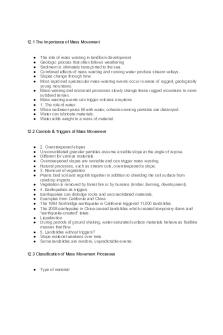
12 - Lecture notes 12
- 3 Pages

Marxist geography - Notes
- 8 Pages
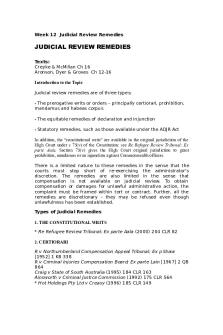
Lecture notes, lecture 12
- 9 Pages

Criminology - Lecture notes All topics
- 180 Pages

Criminology - Lecture notes 1-22
- 73 Pages

Lecture notes, lecture 12
- 7 Pages

Criminology - notes
- 12 Pages
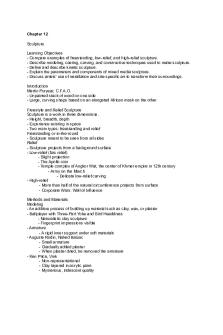
Chapter 12 - Lecture notes 12
- 4 Pages

Lab 12 - Lecture notes 12
- 5 Pages
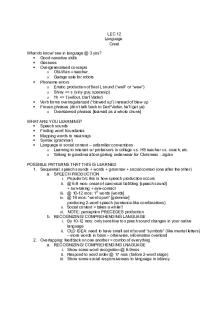
LEC 12 - Lecture notes 12
- 3 Pages
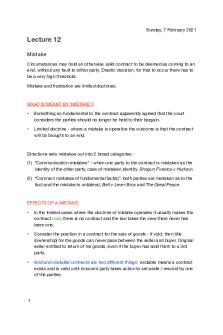
(12) Mistake - Lecture notes 12
- 8 Pages
Popular Institutions
- Tinajero National High School - Annex
- Politeknik Caltex Riau
- Yokohama City University
- SGT University
- University of Al-Qadisiyah
- Divine Word College of Vigan
- Techniek College Rotterdam
- Universidade de Santiago
- Universiti Teknologi MARA Cawangan Johor Kampus Pasir Gudang
- Poltekkes Kemenkes Yogyakarta
- Baguio City National High School
- Colegio san marcos
- preparatoria uno
- Centro de Bachillerato Tecnológico Industrial y de Servicios No. 107
- Dalian Maritime University
- Quang Trung Secondary School
- Colegio Tecnológico en Informática
- Corporación Regional de Educación Superior
- Grupo CEDVA
- Dar Al Uloom University
- Centro de Estudios Preuniversitarios de la Universidad Nacional de Ingeniería
- 上智大学
- Aakash International School, Nuna Majara
- San Felipe Neri Catholic School
- Kang Chiao International School - New Taipei City
- Misamis Occidental National High School
- Institución Educativa Escuela Normal Juan Ladrilleros
- Kolehiyo ng Pantukan
- Batanes State College
- Instituto Continental
- Sekolah Menengah Kejuruan Kesehatan Kaltara (Tarakan)
- Colegio de La Inmaculada Concepcion - Cebu



